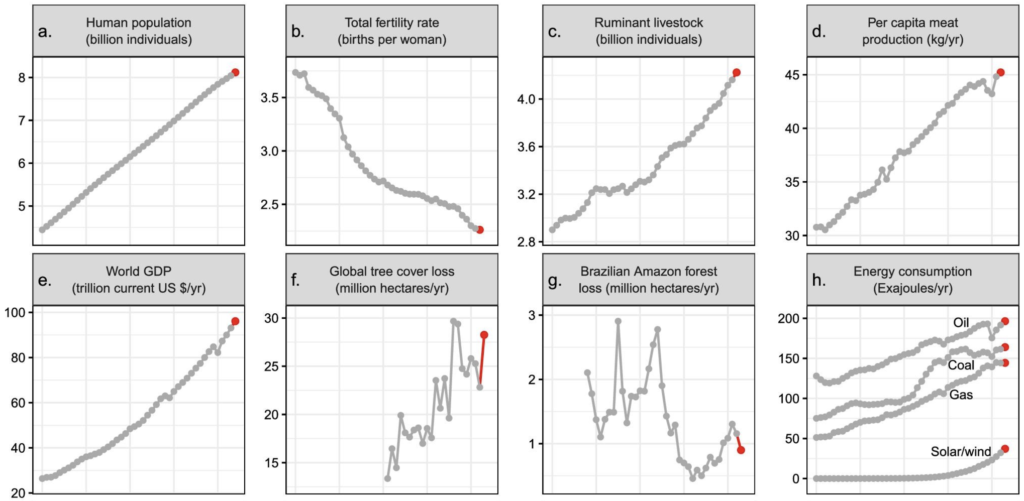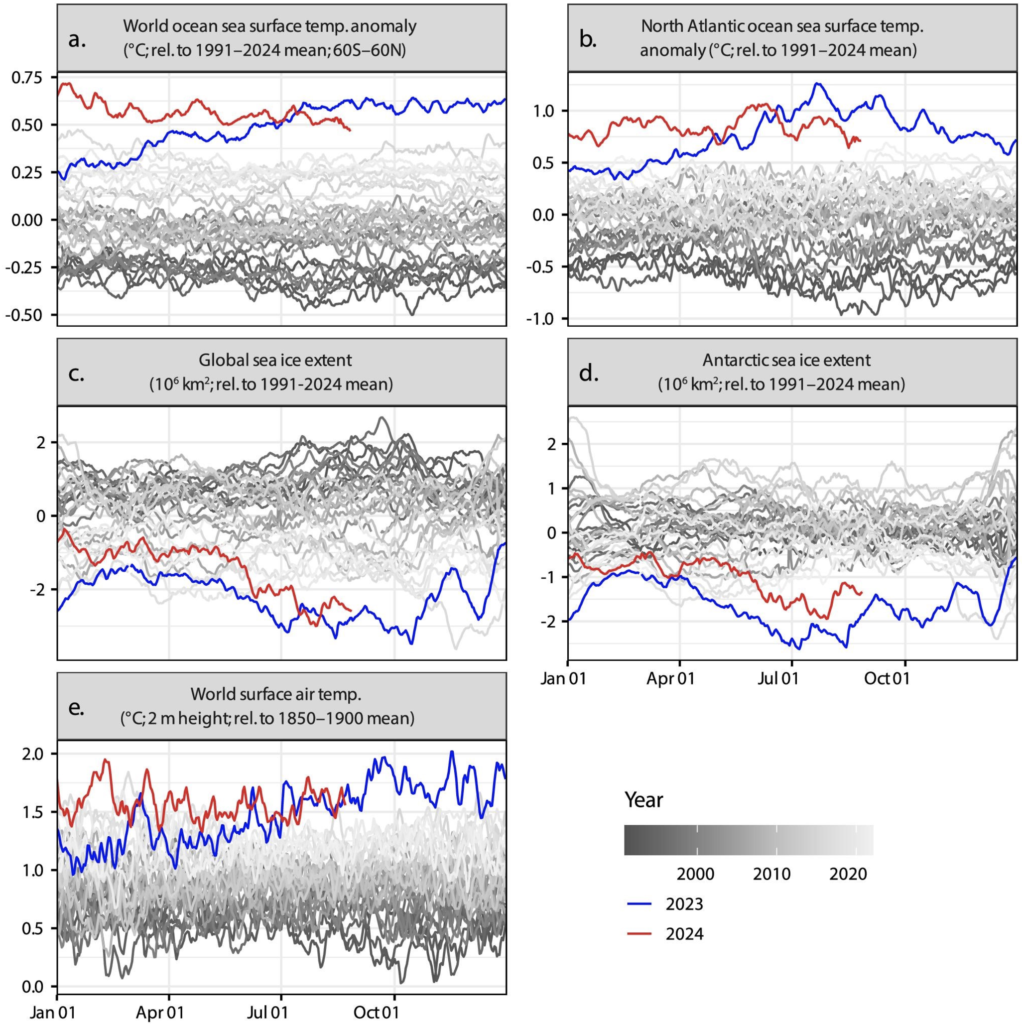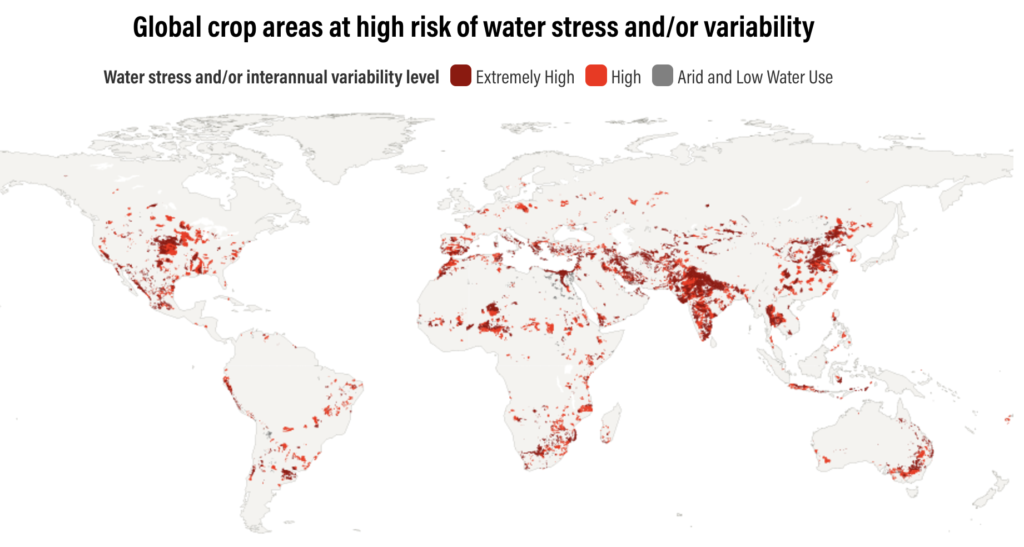Environment: The future of humanity hangs in the balance
November 24, 2024
‘We are on the brink of an irreversible climate disaster’, scientists conclude. Donkeys: feral pests or nature’s saviours? Climate change threatens global food security and farmers’ incomes.
‘Perilous times on planet Earth’
‘We are on the brink of an irreversible climate disaster. This is a global emergency beyond any doubt. Much of the very fabric of life on Earth is imperilled. We are stepping into a critical and unpredictable new phase of the climate crisis. Despite warnings, we are still moving in the wrong direction; fossil fuel emissions have increased to an all-time high, the 3 hottest days ever occurred in July of 2024, and current policies have us on track for approximately 2.7 degrees Celsius (°C) peak warming by 2100. Tragically, we are failing to avoid serious impacts, and we can now only hope to limit the extent of the damage. We are witnessing the grim reality of the forecasts as climate impacts escalate, bringing forth scenes of unprecedented disasters around the world and human and nonhuman suffering. We find ourselves amid an abrupt climate upheaval, a dire situation never before encountered in the annals of human existence. We have now brought the planet into climatic conditions never witnessed by us or our prehistoric relatives within our genus, Homo.’
This is from the opening paragraph of an article in the journal Bioscience by fourteen highly respected climate scientists who feel it is ‘our moral duty and that of our institutions to alert humanity to the growing threats’. The article analyses the latest trends across an array of the planet’s vital signs, reviews recent climate-related disasters, and provides snappy summaries of an eclectic range of climate issues (e.g. human population size and consumption, energy, forests, coral bleaching, social justice, feedback loops and tipping points, and the risk of societal collapse).

Human activities that harm the natural environment and destabilise the global climate 1980-2024

Changes in the natural environment (climate anomalies) 1991-2024. In each case, the general trend of the last 30 years has become more extreme in the last two years.
The authors conclude that the evidence is ‘alarming and undeniable’, that the outlook for the world’s poor is ‘horrific’, that the world has made very minor headway on tackling climate change, indeed that we are currently going in the wrong direction, and that they fear the danger of a climate catastrophe and climate breakdown.
A few commendable but very broad and not new policy goals and ideas are proposed:
- A rapid phase down of fossil fuel use as a top priority, partially achieved through high global prices on both carbon and methane. The revenue raised could be used for climate mitigation and adaptation programs and to restrain the emissions of the wealthy.
- Transformative changes across society to drastically reduce overconsumption and waste, especially by the affluent, gradually reduce the human population, reform food production and consume more plant-based diets.
- ‘Adopting an ecological and post-growth economics framework that ensures social justice’ – sounds great but it’s not clear exactly what the authors have in mind.
- Greater effort to protect, restore and re-wild ecosystems.
The article finishes in the same vein as it started: ‘The surge in yearly climate disasters shows we are in a major crisis with worse to come if we continue with business as usual. Humanity’s future depends on our creativity, moral fibre, and perseverance. The future of humanity hangs in the balance’.
Donkeys in the outback
If you missed it, it’s worth taking a look at the ABC’s Australian Story broadcast on November 4th (or transcript available online). The story highlights a range of environmental dilemmas.
In a nutshell, Chris Henggeler bought the remote Kachana Station 120km south west of Kununura as the crow flies (and flying is the only way to get there) nearly 40 years ago. Chris is very determined, very innovative and very hard working and has had nothing but the best of intentions for the property since the beginning.
It didn’t take long for Chris to realise that the soil was blowing away, the land was becoming like a desert and that he had to do something to stop the rot. His first response was to destock but that seemed to make things worse. His controversial next move was to install more cattle and ‘wild’ donkeys, practising ‘holistic’ land management:
‘“We view our cattle to be the gardeners; to mulch, fertilise and prune the vegetation, build soils, rehydrate the landscapes,” Chris says.
The donkeys extend that work to places cattle don’t readily go; into the rocky ranges and spinifex-coated plateaus that make up the bulk of Kachana.’
Chris’s logic is that the hard-hooved cattle and donkeys are recreating the ground conditions that megafauna created when they roamed across Australia.
Not surprisingly, however, the WA Department of Agriculture and Regional Development don’t think much of Chris’s donkeys (‘feral pests’ in WA) and issued him with a cull order in 2021 - a direction Chris has refused to implement. Chris has gathered evidence to support his case and has appealed to the WA Administrative Tribunal.
I am not at all qualified to comment on the science or the law in this dispute and I admit that there seems to be little doubt that Chris has created a much wetter, greener environment than existed a few decades ago. But the crucial point, as I see it, is not whether the country now looks more pleasant (to some eyes) than 30 years ago but the extent to which it resembles a pre-colonisation environment. Simply making somewhere verdant that hasn’t looked that way in recent centuries does not seem like nature conservation or regeneration. It seems more like the generation of a new ecosystem.
That said, the Department of Agriculture doesn’t have a problem with Chris’s (or any other grazier’s) cattle which have similar effects on the environment as his donkeys. The dispute may be more about what the WA law defines as a ‘pest’ than what’s good for nature.
Have a look at the program and see what you think.
Extreme heat reduces crops and farmers’ incomes
In Kansas, climate change is already seriously affecting farmers’ output and income. Forty years (1981-2020) of data on crop yields, farmers’ incomes and temperature covering 7,000 wheat, soybean and corn farms in Kansas has been used to examine the effect of extreme heat on crop yields and farmers’ income. A measure of farm exposure to extreme heat (extreme-degree days or EDD) was calculated from the number of days when the temperature was above 32oC (the temperature at which yields start to decline) and the amount by which the temperature exceeded 32oC on each day.
The EDDs per year increased from 54 to 57 between the first and second decades of the study.
Warming of 1oC was associated with a 16-20% reduction in crop yields and a 66% drop in farm net income. Although warmer temperatures also increased the length of the growing season, the negative effects of extreme temperatures were stronger than the positive effects of the longer growing season.
By 2050, hot days are projected to double and crop yields to fall by 20-30%.
Over a 30-year period, the value of the farmers’ land increased by 53% but it would have been 58% without the increasing extreme heat.
Farmers’ financial losses were reduced by having crop insurance (which halved net income losses from extreme heat), government payments, access to irrigation and smoothing yearly incomes by holding some crops in storage during good years (hardly a novel approach, Joseph, the one with the colourful coat, was a fan of that strategy thousands of years ago). The results quoted above took all of these strategies into account.
Australia is not Kansas but it’s difficult to believe that Australian farmers are not going to experience very similar problems. In fact, eastern and southwestern Australia are among the world’s crop growing areas most at high risk of water stress in coming years as a result of global warming and unpredictable rain.

Action by individual farmers, farmers’ organisations, insurance companies, lenders, researchers, seed companies and government is required to help individual farmers manage their land and ensure an adequate supply of food as global warming increases. Strategies for managing water more sustainably and ensuring food security include: better measurement and risk assessment, reducing food loss and waste, shifting to more plant-based diets, not converting land to plantations for bioenergy, increasing water use efficiency, investing in nature-based solutions such as protecting and restoring forests and regenerative farming, and ensuring that water is distributed equitably throughout a basin.
Still increasing fossil fuel emissions create the perilous times
The production of CO2 from the burning of fossil fuels and related industrial activities such as cement making, both in total and from each component, continues to increase despite 30 years of talking and promising. A further just lest than 1% increase in the total CO2 emissions from fossil fuels is expected in 2024 and there seems to be no sign that fossil CO2 emissions have peaked.
Fossil fuel related CO2 emissions (total top; by source bottom)
 
